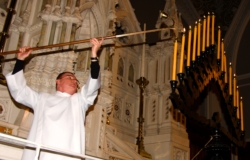From Cardinal Seán’s blog
Stem-cell research. Last week Gov. Deval Patrick made what we consider to be an unfortunate statement on stem-cell research and the bishops of Massachusetts thought that we best try to clarify.
We published a statement April 3 (printed in last week’s Pilot) in which we articulated the Catholic Church’s stand on stem-cell research and emphasized that we are very much in favor of scientific investigation. As Church, we would, of course, like to have cures found for all kinds of diseases. However, ethical considerations always have to be a part of what we do in the area of science. Science has progressed very, very rapidly but ethical thinking -- what is moral, what is proper -- requires reflection. It also requires a commitment to do what is respectful of the dignity of human life.
When the media promote embryonic stem-cell research, they often give the impression that those who oppose it are some sort of religious fanatics. They make it sound as if those who oppose such research are completely indifferent to discovering scientific cures. In actuality, the scientific cures are coming about through the ethical ways of doing things, and we are simply asking that resources be used to further the wonderful work that is respectful of who we are as human beings.
Violence in the city
On Palm Sunday I visited two parishes in the inner-city neighborhoods in Boston to speak with the parishioners about the violence in our city. The city of Boston is facing a very serious crisis. Violence in the inner-city streets is greatly escalating. It is a great source of anxiety for all of us, particularly when we see young people being wantonly murdered even in broad daylight. It is sad that there are so many weapons out there and so little respect for human life.
At St. Katharine Drexel Parish in Roxbury, I spoke at the end of the homily and at St. Peter Parish in Dorchester after Communion. I had actually been visiting Father Walter Waldron in St. Patrick’s in Roxbury the night before, who is doing such a wonderful job in the inner city.
I told the Catholics at both parishes that on Palm Sunday, Christ went into the city even though it was dangerous. In the middle of the danger, Christ wants to be with us. The violence comes from the unbridled individualism of our age and is a result of the philosophy of life in a culture that is addicted to entertainment. Very often, entertainment means violence, sex and drugs. As Christians, we are trying to build a civilization of love where people are responsible for one another and have concern for their fellow man. What we do to build strong communities is the antidote to that violence. I just wanted to thank them for being part of their parishes and encourage them to make their parish communities stronger. That is the way to strengthen family life and to make the community safer for everyone.
Tenebrae
The liturgical documents suggest that during Holy Week there should be a public recitation of the hours in the cathedral. I thought a very good way to do that and to get a larger number of people is to re-institute the practice of Tenebrae, which adds a little bit of drama to the event. It is a beautiful and ancient service, which basically is the praying of the psalms and the chanting of the lamentations from the Old Testament. Then we also chant the Benedictus from lauds of Holy Thursday. We have the candelabra called the hearse, and after each of the psalms, another candle is extinguished until only the last candle, Christ’s candle, remains. Father Sean Connors did a wonderful job preaching at the service.
Tenebrae means “darkness” in Latin, and the service ends with the “Strepitus,” a rumbling of the organ that resembles the banging of breviaries or the sounds of the earthquake mentioned in Scriptures or the people rushing. There are many different interpretations of what



















